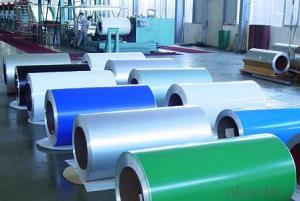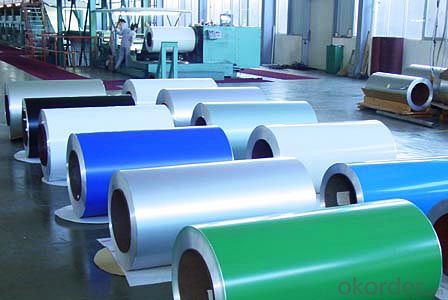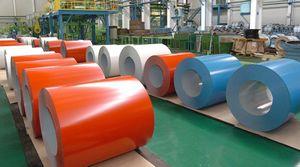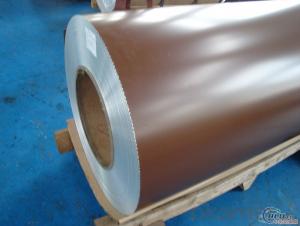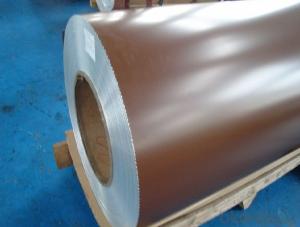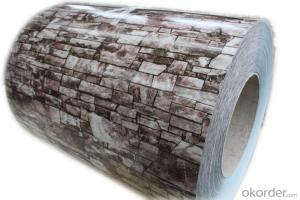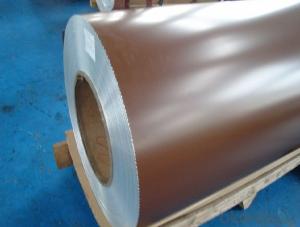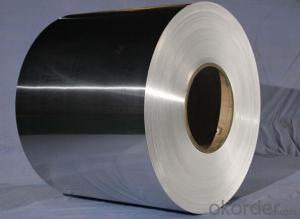Customized 3003 Aluminum Coil with Aluminium Power Coating and PVDF Dupont Paint
- Loading Port:
- Shanghai
- Payment Terms:
- TT OR LC
- Min Order Qty:
- 5 m.t.
- Supply Capability:
- 2000 m.t./month
OKorder Service Pledge
OKorder Financial Service
You Might Also Like
Specification
Structure of Aluminium Power Coating with PVDF Dupont Paint Description:
Coated aluminum coil/sheet are of a wide range of colors, which gives wonderful appearance no matter in residential and commercial constructions of great exhibition centers.
The coated aluminum coil/sheet have been widely used in the fields of construction and decoration( garage doors, ceiling etc.), electronic appliances, lighting decoration, air-condition air pipes, sandwich panels and drainages etc.
Main Features of the Aluminium Power Coating with PVDF Dupont Paint:
1) High flexibility
2) Impact resistance
3) Excellent weather-proof durability
4) Anti-ultraviolet
5) High erosion resist
Images of the Aluminium Power Coating with PVDF Dupont Paint:
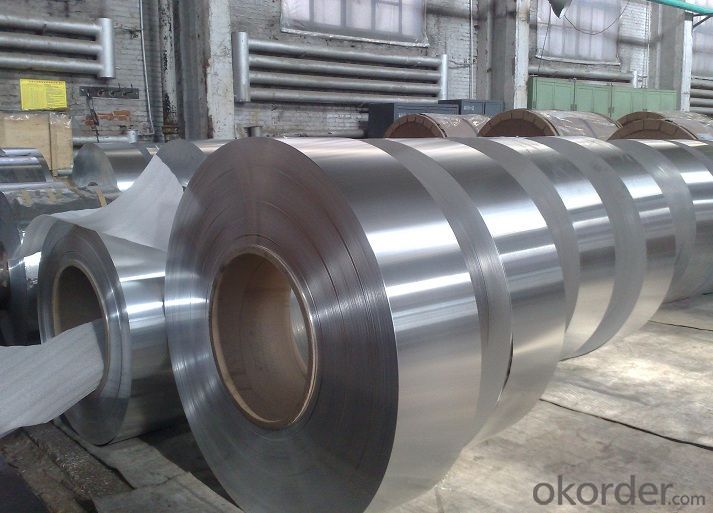
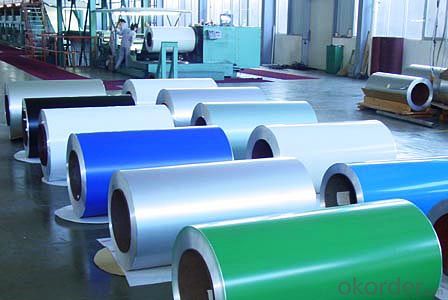
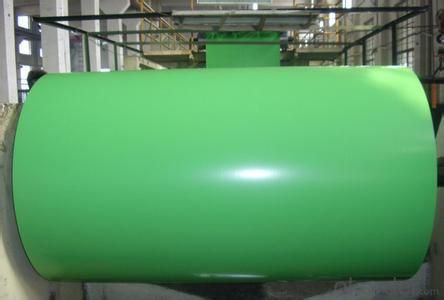
Aluminium Power Coating with PVDF Dupont Paint Specification:
FAQ:
a.What is monthly capacity
---CNBM is one stated own company and our monthly capacity is about 2000tons.
b. Now which countries do you export your goods?
---Now we export to South East Asia,Africa, North America,South America ect.
- Q: What are the potential applications of anodized aluminum coils?
- Anodized aluminum coils possess a multitude of possible uses across various industries. The construction industry heavily relies on anodized aluminum coils, utilizing them for cladding and façade systems. The anodized coating enhances the aluminum's durability, weather resistance, and aesthetic appeal. Its ability to withstand harsh environmental conditions, such as UV radiation, saltwater exposure, and extreme temperatures, makes it an optimal choice for building exteriors. The automotive industry also benefits significantly from anodized aluminum coils. The anodized coating adds a protective layer that enhances the aluminum's corrosion resistance, making it suitable for a wide range of automotive components. These coils can be used for trim, body panels, window frames, and other parts that require both durability and an attractive appearance. Consumer electronics manufacturing also utilizes anodized aluminum coils due to their scratch resistance, electrical insulation, and heat dissipation properties. The anodized coating makes it suitable for electronic enclosures, heat sinks, and connectors. Moreover, the ability to achieve vibrant colors through anodization allows for customizable designs that appeal to consumers. The heating, ventilation, and air conditioning (HVAC) industry extensively uses anodized aluminum coils due to their lightweight nature and excellent heat conductivity. Heat exchangers, air conditioning coils, and evaporator coils commonly utilize these coils. The anodized coating provides protection against corrosion caused by moisture and other environmental factors, ensuring the longevity and efficiency of these HVAC components. Furthermore, the food and beverage industry finds applications for anodized aluminum coils due to the hygienic surface provided by the anodized coating. It is easy to clean and resistant to bacterial growth, making it suitable for food processing equipment, storage tanks, and packaging materials. This ensures the safety and quality of the products. In conclusion, anodized aluminum coils possess vast and diverse potential applications, ranging from construction and automotive to electronics and food processing. The unique combination of durability, corrosion resistance, heat dissipation, and aesthetic appeal makes anodized aluminum coils a versatile material that finds use in numerous industries.
- Q: What are the main causes of aluminum strip rolling?
- Also, what types of mill, simple four roll or roll type control of CVC and HC mills?
- Q: Aluminum reacts with water so why is it used in buildings and cooking??Some help by today would be good!! :DThanxx
- There are some doctors who say not to cook with aluminum as over time the metal can enter your system and harm you. I do not know what they say about non-stick whether there are dangers or not but i don't like them anyway. I prefer iron skillets and stainless steel for pots. And the iron does get into your system but you need a certain amount of iron. I guess in buildings it is used because it is light.
- Q: What are the different packaging weights available for aluminum coils?
- The available packaging weights for aluminum coils vary depending on specific requirements and applications. Aluminum coils can be packaged in a range of weights, typically measured in pounds or kilograms. The specific packaging weight depends on factors such as coil size, thickness, and the quantity needed by the customer or industry standards. For larger industrial applications, common packaging weights for aluminum coils can range from as low as 500 pounds (or 227 kilograms) to several thousand pounds (or several metric tons). These weights guarantee secure and efficient transportation and storage, as well as easy handling and loading. It is worth mentioning that the packaging weight of aluminum coils can be customized to meet specific needs. Manufacturers and suppliers often collaborate closely with customers to determine the most suitable packaging weight based on transportation requirements, storage space limitations, and industry regulations. In conclusion, the packaging weights for aluminum coils are flexible and can be personalized to meet individual needs, ensuring safe and convenient handling while satisfying the demands of different industries.
- Q: Can aluminum coils be painted for custom designs?
- Yes, aluminum coils can be painted for custom designs. Painting aluminum coils allows for endless possibilities in terms of customization and aesthetics. The coils can be painted with various colors, patterns, and designs to suit individual preferences and requirements. The paint application process involves cleaning the surface, applying a primer, and then applying the desired paint or coating. By painting aluminum coils, it is possible to create unique and eye-catching custom designs for a range of applications, including architectural elements, signage, automotive parts, and more. Additionally, the paint helps protect the aluminum from corrosion and enhances its durability.
- Q: This question seeks advice on methods to prevent rust formation on aluminum coils.
- <p>To prevent rust on aluminum coil, ensure proper storage conditions by keeping the coils dry and avoiding contact with moisture. Use protective coatings or sealants that are compatible with aluminum to create a barrier against the elements. Regularly inspect the coils for signs of corrosion and clean them with a non-abrasive cleaner to remove any contaminants. Avoid using harsh chemicals that could accelerate oxidation. Maintain good ventilation in storage areas to reduce humidity, which can contribute to rust formation. Finally, consider using anodizing or other surface treatments that enhance the aluminum's natural resistance to corrosion.</p>
- Q: What are the potential health risks associated with aluminum coils?
- The potential health risks associated with aluminum coils primarily revolve around exposure to aluminum particles, which can occur through inhalation or ingestion. Prolonged exposure to these particles may contribute to respiratory issues such as asthma and lung inflammation. Additionally, there is some concern about the potential connection between aluminum exposure and Alzheimer's disease, although more research is needed to establish a conclusive link. To mitigate these risks, it is advisable to ensure proper ventilation, minimize direct contact with aluminum surfaces, and maintain good cleaning practices to reduce the likelihood of particle release.
- Q: What are the different widths available for aluminum coils?
- The different widths available for aluminum coils can vary depending on the manufacturer and specific application. However, the most common widths for aluminum coils range from as small as 12 inches up to 60 inches or more. These widths are typically measured in inches and can be customized to fit specific industrial or commercial needs. The selection of the appropriate width for aluminum coils is crucial as it directly affects the efficiency and effectiveness of various processes such as manufacturing, construction, and transportation. Additionally, the width of aluminum coils can also impact the cost and availability of the material, making it an important consideration for both buyers and suppliers.
- Q: What are the different coil winding options available for aluminum coils?
- Some of the different coil winding options available for aluminum coils include: 1. Layer winding: This involves winding the aluminum coil in a single layer, where each turn is adjacent to the previous one. This method ensures uniform distribution of the winding and is commonly used for small to medium-sized coils. 2. Pancake winding: In pancake winding, the aluminum coil is wound in a flat, spiral shape. This method is often used for large coils as it allows for efficient use of space and easy handling during transportation. 3. Concentric winding: Concentric winding involves winding the aluminum coil in multiple layers, with each layer placed concentrically around the previous one. This method is suitable for coils that require higher power and voltage ratings. 4. Random winding: Random winding refers to a method where the aluminum coil is wound in a non-uniform or irregular pattern. This technique is typically used for special applications or when the coil needs to fit into a specific space or shape. Overall, the choice of coil winding option depends on factors such as coil size, power requirements, space limitations, and specific application needs.
- Q: What are the fire-resistant properties of aluminum coils?
- Aluminum coils have excellent fire-resistant properties due to the inherent characteristics of aluminum as a metal. Aluminum has a high melting point of 660 degrees Celsius (1220 degrees Fahrenheit), which means it can withstand high temperatures without melting. This property makes aluminum coils resistant to fire hazards. Moreover, aluminum does not generate flammable gases when exposed to fire, unlike some other metals. This non-combustible nature prevents the spread of fire and minimizes the risk of fire-related damages. Additionally, aluminum has a low thermal conductivity, meaning it does not conduct heat efficiently. As a result, aluminum coils do not contribute to the transfer of heat from one area to another, which can help contain and control the spread of fire. Furthermore, aluminum coils are often coated with a protective layer that enhances their fire resistance. These coatings can be made of various materials such as polyvinylidene fluoride (PVDF) or polyester, which provide an additional barrier against fire and heat. These coatings are designed to withstand extreme temperatures while maintaining their integrity, further enhancing the fire-resistant properties of aluminum coils. Overall, aluminum coils possess excellent fire-resistant properties due to their high melting point, non-combustible nature, low thermal conductivity, and protective coatings. These properties make aluminum coils a reliable choice for applications where fire safety is a concern, such as in building construction, electrical wiring, and transportation industries.
Send your message to us
Customized 3003 Aluminum Coil with Aluminium Power Coating and PVDF Dupont Paint
- Loading Port:
- Shanghai
- Payment Terms:
- TT OR LC
- Min Order Qty:
- 5 m.t.
- Supply Capability:
- 2000 m.t./month
OKorder Service Pledge
OKorder Financial Service
Similar products
Hot products
Hot Searches
Related keywords
